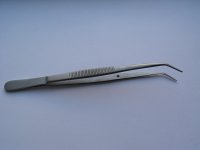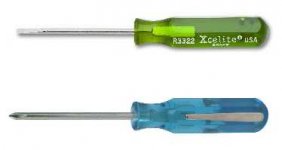What are your favorite tools (make and model) for building your DIY audio projects? Do you have something that has withstood the test of time? Something that represents great value and everyone should have?
If we get enough posts in this thread, we'll make it a sticky and add them to our recommended tool list. Links to places where the tools can be purchased appreciated!
Cheers!
If we get enough posts in this thread, we'll make it a sticky and add them to our recommended tool list. Links to places where the tools can be purchased appreciated!
Cheers!
Last edited:
+1^^^^
I love my Dremel, it sits next to me ready on my bench. It amazes me how many things I use it for.
I assume you don;t need us to list scopes and meters.
I love spring pullers and other hooks. I don;t recall when I first bought one - 35 years ago maybe? - but one of my favorite tools is from the auto parts store - the O-ring seal pick. A point on one end and a hook on the other. Here is a link to one:
O-Ring & Seal Pick F/Remove&Install O-Rings&Small Oil Seals | Fastenal
You dentist uses similar things to pick from between your teeth. Spring puller and spring pushers I first ran into with a guy servicing old mechanical cash registers and adding machines. Long thin rods with small hooks on the end. You could reach into the works of something, and catch the end of a spring, and push it over its mount. They are especially useful to fish little rubber belts in and out of tape deck transports.
PC boards are often mounted on the little plastic posts that poke through a hole on the board, and a little barb sticks out the side to prevent it backing out. I have a couple small pieces of tubing to use as extractors. I have a length of thinwall brass tube that is 3/16 OD, about 5mm, and the inside diameter a little smaller, of course. You shove teh tube down over the plastic point, that compresses the barb within the post, then pull up on the board. The post slides through the hole easily. I have a 1/4" OD plastic tube with similar ID to the brass one for the same purpose. You can pay big money for
"extractor tools" for this, but a cheap piece of tubing works just fine.
And cheap plastic calipers - I always called it a micrometer myself - I use all the time for quick dimensions. Is that pot a 12mm or 14mm size? Is that a 6mm shaft on it or 6.35mm?

$2 at Harbor Freight:6" Utility Caliper
I love my Dremel, it sits next to me ready on my bench. It amazes me how many things I use it for.
I assume you don;t need us to list scopes and meters.
I love spring pullers and other hooks. I don;t recall when I first bought one - 35 years ago maybe? - but one of my favorite tools is from the auto parts store - the O-ring seal pick. A point on one end and a hook on the other. Here is a link to one:
O-Ring & Seal Pick F/Remove&Install O-Rings&Small Oil Seals | Fastenal
You dentist uses similar things to pick from between your teeth. Spring puller and spring pushers I first ran into with a guy servicing old mechanical cash registers and adding machines. Long thin rods with small hooks on the end. You could reach into the works of something, and catch the end of a spring, and push it over its mount. They are especially useful to fish little rubber belts in and out of tape deck transports.
PC boards are often mounted on the little plastic posts that poke through a hole on the board, and a little barb sticks out the side to prevent it backing out. I have a couple small pieces of tubing to use as extractors. I have a length of thinwall brass tube that is 3/16 OD, about 5mm, and the inside diameter a little smaller, of course. You shove teh tube down over the plastic point, that compresses the barb within the post, then pull up on the board. The post slides through the hole easily. I have a 1/4" OD plastic tube with similar ID to the brass one for the same purpose. You can pay big money for
"extractor tools" for this, but a cheap piece of tubing works just fine.
And cheap plastic calipers - I always called it a micrometer myself - I use all the time for quick dimensions. Is that pot a 12mm or 14mm size? Is that a 6mm shaft on it or 6.35mm?

$2 at Harbor Freight:6" Utility Caliper
One of the handiest "tools" I have used is a "lazy susan", i.e. a small rotatable platform, about one inch tall, that sits on my benchtop. Large discount stores often sell cheap ones for TVs to sit on. I attached a circular wooden tabletop on mine, about 16 to 18 inches in diameter. A conductive mat might be a nice touch. It's so much nicer to work on something when I can easily rotate it to any angle.
Over 50 years ago, I bought a set of "service tweezers" for my shop. I had no idea how useful they would prove to be. One tweezer you squeeze and then can slide a little latch to hold them closed, another one you squeeze to open. perfect for holding a wire in place or whatever.
And all this time, I never thought to grab some of my mother's clothes pins. Great idea jack.
And all this time, I never thought to grab some of my mother's clothes pins. Great idea jack.
I do love my little cable tester. Especially since I work in pro audio, where cables are constantly being connected and disconnected and coiled up and transported. Mine is an old Whirlwind, but I do love it. Newer units include Speakon cables and other more recently popular cable types.
I'd say my most useful tools so far have been:
- Uni-T UT61E multimeter - This is by far my favorite tool. It's incredibly well built (for the price), easy to read, and its pretty much agreed the best meter from the perspective of features and accuracy in the sub $60 category. I call it a great starter meter when you want something more serious than a sub-$20 POS model but can't afford one of the top name flukes. It's not perfect (input protection could be better but it does do CATII 600V and CATIII 300V with certification in Europe, just not the CATIII600V and CATII1000V it claims). It's 20,000 count, TrueRMS, auto-ranging, very nicely accurate (does much better than its specs claim), etc.
- My o-scope (got it from a member on here) there are likely better values out there for someone buying it themselves(I got it for free just had to pay shipping) but in my day-to-day usage the scope has been very valuable.
- My 936 clone soldering station. Once again its a great starter iron when you want to step-up from the radioshack wall plug model. The tips (and pretty much every other replacement part) are easily available everywhere (and for cheap). The latter is very important when you are learning soldering for the first time because you will destroy a lot of tips.
- Electrodroid - an incredibly useful android application that contains all sorts of things you could find easily on google but puts them all it one convenient place. Things like cut-off frequency calculator (RC or LC, you can hold any two values constant and calculate the third), resistor color band calculator, heatsink temp calculator, pinouts, voltage drop on a pcb trace, etc. Oh yeah and its free (there is a donate version that adds a few small features but these are not really anythign special, its mainly just to donate to the programer for the awesome app).
Last edited:
[*]Electrodroid - an incredibly useful android application that contains all sorts of things you could find easily on google but puts them all it one convenient place. Things like cut-off frequency calculator (RC or LC, you can hold any two values constant and calculate the third), resistor color band calculator, heatsink temp calculator, pinouts, voltage drop on a pcb trace, etc.
Does it exist also for iphone?
If I do not have the DEN-ON SC-7000Z Soldering and desoldering tools at hand, then lots of solder wick.
Does it exist also for iphone?
I'm sure there is an equivalent (couldn't find one via a quick google search but I'm sure its there) but at this time Electrodroid is only available for Android and Windows Phone (just released).
Here is the website for electrodroid:
Link
Test equipment: Fluke 45 (and assorted handhelds), Hitachi 100MHz analogue scope, HP200CD audio generator. Dunno if the AVO mkIV valve tester qualifies as favourite given the time I have just spent repairing and calibrating it, but it sure is nice looking!
Hand tools: Weller magnastat iron (bomb proof and I have lifetime's worth of tips and spares for it!), little Lindstrom smooth jaw pliers, an assortment of screwdrivers by Belzer, and so it goes on. Hard to pick absolute favourites with some of these since the tool drawers represent a life-long fascination with electronics
Hand tools: Weller magnastat iron (bomb proof and I have lifetime's worth of tips and spares for it!), little Lindstrom smooth jaw pliers, an assortment of screwdrivers by Belzer, and so it goes on. Hard to pick absolute favourites with some of these since the tool drawers represent a life-long fascination with electronics
I use these often. Often enough that I have 2 sets - 1 for the bench and one for the toolkit. The Xcelite R3322 and P12S mini screwdrivers. Mine are 25 years old and still good as new (even though they can be handy for more than just turning screws). Available from most Cooper/Weller/Xcelite/Apex dealers.
Attachments
- Status
- This old topic is closed. If you want to reopen this topic, contact a moderator using the "Report Post" button.
- Home
- Design & Build
- Equipment & Tools
- Favorite tools

